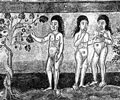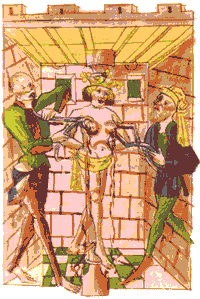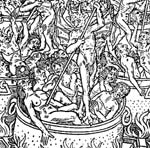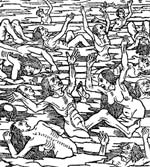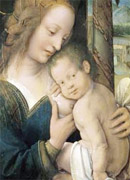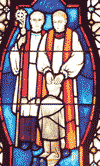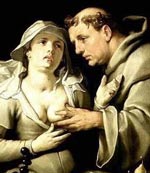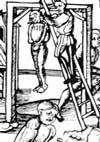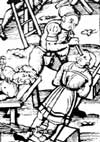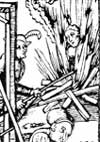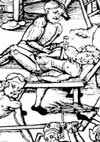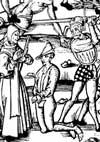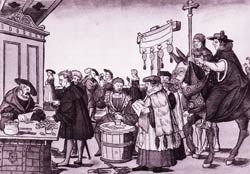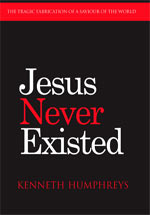"I do not see any sin in the world, but I see a great deal of ignorance."– George Sand.
"Out of the doctrine of original sin grew the crimes and miseries of asceticism, celibacy and witchcraft; woman becoming the helpless victim of all these delusions."
– Elizabeth Cady Stanton [1815-1902], US feminist.
The Ever-Popular Sex & Violence!
German, mid-15th c (British Museum)
A fictional female martyr – in this case a Roman empress – has her breasts removed by giant pliers. In truth, such 'saints' were given the vicious deaths actually experienced by heretics and unbelievers.
Judaism says man is a sinner because he sins.
Christianity says man sins because he is a sinner.
S & M fetish? This time its "Saint Agatha".
Hot Tubs – Christian-style!
The lustful are smothered in fire and brimstone.
– (Le grant kalendrier des Bergiers, Troyes, 1496)
Christ Porn!
Sinners enjoy more pleasures of the flesh!
The envious are immersed in freezing water.
(Le grant kalendrier des Bergiers, Troyes, 1496)
High Priest of Sin
"Augustine's primary spiritual task was to remove the stain of sexual desire. He thus became the great theologian of guilt and sin but, as is often the case, he remained blind to the price that others had to pay for his righteousness."
– Bishop J. S. Spong (Born of a Woman, p216)
Pure thoughts!
Sins R Us!
The Church has devised a remarkable catalogue of sins:
Original and actual SinOriginal: the act of disobedience by Adam. Inherited at conception but – for the lucky ones! – remitted in baptism.
Actual: a voluntary act of individual will.Mortal and Venial Sin
Mortal: intrinsically, always and absolutely evil, e.g. blasphemy.
Venial: pardonable, excusable (can even include killing!)
Capital, Cardinal and Grave Sin
(see Deadly Sin)
Material and Formal Sin
Internal Sin ("Thought crime")
delectatio morosa, the pleasure taken in a sinful thought or imagination even without desiring it;
gaudium, dwelling with complacency on sins already committed.
desiderium, the desire for what is sinful.Habitual sin
– in a state of sin until grace restored by penance.
Sins of commission and omission
Sin of commission is a positive act contrary to some prohibitory precept.
Sin of omission is a failure to do what is commanded.
Suffering is the penalty of sin –
and the Church was the agent of that suffering
Pure thoughts!
Deadly Sins
Pride – Remember Lucifer, too proud to serve in Heaven? The Church required a humbled, submissive population.
"According to Christian teachers, the essential vice, the utmost evil, is Pride ...
Pride leads to every other vice: it is the complete anti-God state of mind."
– C. S. Lewis (Mere Christianity, p107)
Envy – The priests had an obvious wealth. You sinned if you compared their opulence to your own poverty.
Avarice – If the Church wanted something you had, you were avaricious if you tried to hang on to it. Remember how St Peter had dispensed death to poor Ananias and his wife Sapphira – wasted for holding back some of the proceeds from the sale of their land! (Acts 5.1,11)
Anger – The iniquitous system might well make you angry. You sinned by the very thought.
Sloth – Slowness to respond to the needs of the Church. Don't even think about it, obey – or you sinned.
Gluttony – Too great an interest in non-religious life made you a glutton. Remain focused on the Church or you sinned.
Lust – The psycho-sexual hang-ups of the priesthood captured in a word. Repressed sexuality served the purposes of the Church.
"The carnal mind is enmity against God; for it is not subject to the law of God, nor indeed can be.”
– Romans. 8.7.
Pure thoughts!
Those sexually hung-up Christians...
"...every one who looks at a woman lustfully has already committed adultery with her in his heart."
– Matthew 5:28
"Lust is disordered desire for or inordinate enjoyment of sexual pleasure."
– The Catechism of the Catholic Church, #2351
"Spouses should know how to keep themselves within the limits of just moderation."
– Pius XII, Discourse, October 29,1951.
"How shall we tie down this wild beast? How shall we put a bridle on it? I know none, save only the restraint of hell fire."
Saint John Chrysostom rages at sex
(P. Brown, The Body & Society, p 309)
Death Duty!
550 AD. Church imposes a tithe, an annual tax of 1/10 of every individual's income.
779 AD. Charlemagne rewards his ally Pope Hadrian I by issuing the Capitulary of Herstal ordering all men within his realm to pay tithes to the Church.
In 1400 the Church decreed it a mortal sin not to leave at least 10 per cent of one's estate to the Church in a Will.
Wages of Sin
The UK Anglican Church earned £4.4 billion in 1999 (Daily Telegraph).
The Mormons (The Church of Jesus Christ of Latter-day Saints), seventh largest US church, in 1997 possessed a minimum of $30 billion in assets and had an annual gross income of $6 billion (Time, July, 1997).
Between 1985 - 1998 the Mormon church spent $162.5 m on various humanitarian aid projects – around 0.21% of the Church's reported non-taxed annual revenue!! Christian charity, eh?!
The earnings and wealth of the Roman Catholic Church are notoriously difficult to estimate. A single sale of bank shares in 1971 netted the Vatican Bank $115 billion (at 1984 values). (David Yallop, In God's Name, p143)
Accumulated wealth of Christendom would be measured in thousands of $billions – most of it thoroughly hidden from public scrutiny.
In comparison, the Mafia is a local pick-pocket.
|
No Sin Here Both the Germanic tribes and the Romans had a sense of criminality and justice. Social transgressions had known consequences delivered by magistrates. When it came to matters of religion, the individual who failed to placate the gods and thus 'transgressed' would reap the consequences of his action directly from the gods – it required no intervention by a priesthood. The gods took care of themselves. The philosophers of the ancient world had no notion of a "sin" nor did any of the pantheistic systems. The Gnostics, although their doctrines varied in detail, likewise had no notion of sin. Even dualistic systems, like Manichaeism and Zoroastrianism, which had two eternal principles, good and evil, at perpetual war with each other, had no true notion of sin. For them, all evil, and consequently sin, came from the principle of evil. But
the Jews had a different idea ...
Sin entered the world with Adam. But of course it never did because Adam never existed (the figure is an archetypal man, symbolizing 'humanity'). Sin actually entered the world in the perverted mind of priestly scribes. A perfect God no doubt could have created a perfect world. But instead God's priests had their deity create Sin. If God's creatures did not sin how could this heavenly monster exercise his 'saving compassion' through the intercession of the priesthood?! Sin, sinfulness and sinners appear in every book in the Bible, several hundred times in fact. Sin is the very foundation of Judeo/Christian religion. It is the dominant theme of the Torah and the Prophets. Who is the author of all this "transgression of God's Law?" In a theology which allows only a single god, there can be only one answer:God himself! According to the paramount Jewish sage, God tells us:
After its encounter with Zaroastrianism, Judaism later acquired the notion of an evil god (Satan), together with his demons, as a counterpoise to the good god (Yahweh) – but even then, Satan can only exist because the "all-powerful" god allows it. Man inevitably sins. The temptations are so appealing, contact with the unclean and bodily discharges are so likely. The answer? The holy charlatans come forward with the notion of repentance and atonement, which – surprise, surprise! – involves obedience of, and payments to, the priests: animal sacrifice will do nicely, thank you. The priests specified a whole variety of offerings ("burnt", "peace", "guilt", "sin") which required either "clean" animals (cattle, sheep, goats, doves, pigeons), cereals, incense or wine (Leviticus 1. 3 ). The fat and inedible parts were burnt (that was God's bit!); blood was smeared or sprinkled on the altar (a bit of drama); the choice cuts and skins went to the priests. The priests eat and the sin of others is atoned. Should an individual refuse to atone, the Torah requires that the sinner be expelled (or killed) to protect the collective from divine retribution.
Rabbi Solly: 'All Are Sinners' The Law obviously gave rabbi St Paul – or rather those who wrote pseudepigraphically in his name – a problem. If the Law was a perfect code of behaviour why was the salvation of Christ necessary?
God makes us all sin so that he can save us! Paul's epistles refer to sin almost a hundred times. According to the radical rabbi, the atonement for all of humanity's sins – past, present, future – had already been paid by the sacrificial death of the god-man Jesus. Aren't we all "saved" then? Only with the intercession of a priest, says Paul, who can bring the sinner to the "grace of god". All the sinner had to do was "accept Jesus". Paul offers "fast-track" salvation for the pagan multitude ... Says Paul:
The Christians devise Bigger, Deadlier Sins ... Judaism had had its sin but at least it allowed for the occasional appearance of men of "righteousness". In the sacred mythology, these paragons appeared from time to time to berate their fellow tribesmen. But Christianity went further. In the demented mind of the Christian theologians, sin became more obnoxious than it had ever been. As Christianity developed so too did sin. No longer was sin just an action (Romans 1:32); transgression could occur in word (e.g. Matthew 5.22), or thought (e.g. 1 John 3.15) – "Thought Crime" would accompany the arrival of Church totalitarianism. The natural self, with carnal instincts, had to be denied. The guilt that any transgression engendered, even for the tiniest infraction, fed the psychosis upon which Christianity flourished. Sins became cardinal or deadly. Deliberate disobedience of the known will of God required the harshest punishment – death and the torments of hell. Rebellion against God’s law was far worse than the calamitous behaviour of princes that merely produced distress, sorrow and suffering. Empowered by the authority of the Roman state, the fanatics of Christ were more proactive than Jewish scribes had ever been. It became their sacred duty to hunt out and punish sinners.
Sex-obsessed old men define doctrine Early Church fathers, of the 2nd and 3rd centuries, made allusions to a doctrine of an "original sin." Tertullian, perhaps influenced by stoicism and the belief in the essential unity of matter and spirit, thought the soul to be physical, passed on by parents in the act of procreation. (He gives an account of a Montanist prophetess, who professed to have seen a soul and attempted to describe its appearance!). Tertullian taught when a parent sinned, this physical taint of the soul was passed on to children. Origen, a more speculative theorist, argued for a preexistence of the soul. He felt sure all men had sinned and had fallen in this former existence. Fallen man had been banished by God into material bodies to be disciplined and purified. Origen, like Augustine after him, supposed that there was an inherent pollution and sinfulness in sexual union, the means by which sin entered the world. A woman's pains in childbirth were in themselves clear evidence of the sinfulness of the original act! Augustine (known as the 'Great Sinner' after the candour of his Confessions) was obsessed with the lust of procreation – undoubtedly a reflection of his own dysfunctional sexuality. Wildly promiscuous in his early life, he had abandoned two mistresses, one with his child, and the illicit affairs had filled him with guilt. In later years, he did not trust himself to be left alone with a woman. In his City of God, Augustine considers the conjecture that:
Says Augustine,
Thanks to St Augustine and the Church, guilt over the most natural of human proclivities was inculcated into generation after generation of humanity – an irrational and morbid guilt no less present among "believers" in the twenty first century as it was in the second or third century.
The Wages of Sin – A Very Wealthy Church
Certain sharp clerics saw the opportunity and declared themselves to be "Confessors". Filled, as they said, with the Holy Spirit, they claimed the right to absolve sins (particularly the sin of apostatising during the Decian persecution) – and just as surely availed themselves of recompense for their efforts. The appearance of this rash of competitive charlatans set alarm bells ringing among the bishops who responded by declaring their own exclusive right to forgive sin. The lucrative sin business was being parceled out among the operatives. Towards the end of the 4th century Augustine made clear that it was only the Catholic hierarchy that could forgive sin:
In the late 6th century, Pope Gregory, an enthusiastic follower of Augustine, codified sins into seven types, folding "vainglory" into pride, "acedia" into sadness, and adding envy. His ranking, from most serious to least was: pride, envy, anger, sadness, avarice, gluttony, and lust. In the 17th century, the Church replaced the vague sin of "sadness" with sloth. The list of sin crimes set the stage for centuries of ecclesiastical extortion: the sale of remissions from sin! The Church had devised the most successful protection racket in history.
Pimping Priests Common venial sins could be remitted by prayer, confession to the clergy, contrition, fervent communion, and other 'pious works', all of which required frequent attendance at Church and appropriate service or recompense to the officiating clergy. Having transformed even a Christian marriage bed into "whoredom" the Church could extract its penance for every act of copulation that involved "lust". Clerical abuse of the institution of "confession", originally made at the feet of the priest, obliged the Church to introduce the confessional box for decency's sake. The saintly Augustine had also provided the dubious theology of purgatory, a holding pen where even compliant Christians would find themselves after death, a place where 'fire might wash them free of sin'. Picking up the message, said Pope Gregory:
The Criminal Clergy More serious mortal sins required even greater sacrifice on the part of the sinner. What need had he of earthly goods when his immortal soul was in peril? According to the demented theology (I Corinthians, 6.9; Matthew, 25.41; Mark, 9.45, etc.), God insists that Sin must be atoned for, either in this world or in the world to come. Punishment in the future life would be proportionate to the sin committed in this life but would also last forever – a tad harsh from a god of love and goodness! In the future life, warned the Church, the penalty for sin would be the 'pain of loss' – that is, "privation of the beatific vision of God". Worse yet, Torment in Hell awaited the sinner, and as the centuries progressed that Christian Hell became an ever-nastier place. Yet for all the theorizing about the afterlife (and the consequent terror it engendered in believers) opting for atonement in the world to come was not an option in the Christian empire. A merciful God had provided a remedy for sin in this life by the institution of His Church!
With a blend of 'eternal bliss' on the one hand and a 'satanic pit' on the other the Church mercilessly exploited the fears, credulity and hopes of humanity. Through centuries, the Church secured not only almost limitless regal patronage but also endowments, estates, and legacies from the wealthy, convinced that they were buying a place in Heaven. From all and sundry the Church collected tithes, indulgences and fees; it sequestered the property of heretics and Jews; it seized the lands of the infidel. Time did not soften the rapacity of the Church. The Council of Trent (1545 - 1563) reaffirmed that all mortal sins had to be confessed. This included even the most intimate, secret thoughts because thoughts ...
In the early years of the 16th century Luther was to become the mouthpiece for those having "dangerous thoughts". Luther reinterpreted Paul's epistles and other key passages in the Bible to argue for a "grace" that could be achieved by an individual's own faith – without acts of penance, the intercession of saints and martyrs, holy pilgrimages, Letters of Pardon, etc. – in fact, without the whole paraphernalia of the ecclesiastic protection racket. Holy Mother Church had become (and remained) Europe's largest landowner, its hierarchs the richest men on the planet, its pontiff a maker and breaker of emperors. When the scions of wealthy Italian families fought or bought their way onto the papal throne it was to control the most successful criminal organisation in history.
Sources:
'Save' a friend e-mail this page
Copyright © 2004-7
by Kenneth Humphreys.
|
|||||||||||||||||||||||||||||||||||||||||||||||||||||||||||||||||||||||||||||||||||||||||
